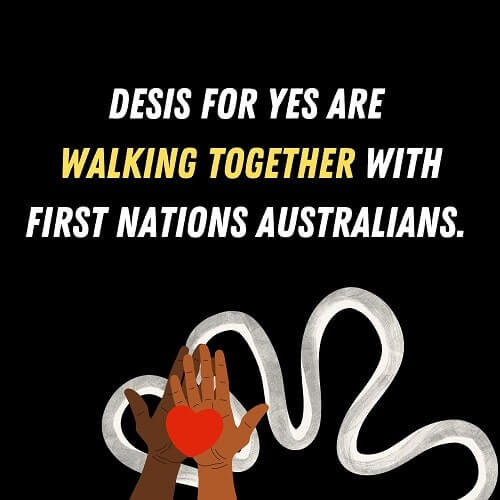Seventy-six years ago, on the 15th of August 1947, India broke free from British colonial rule, penning its own constitution in an act of self-determination.
Today, over 700,000 Indian Australians across the country will celebrate the milestone and reflect on everything this freedom and sovereignty has given our community for generations.
But with the upcoming referendum on constitutional recognition of First Nations Australians, many South Asian Australians are seeing the day as a valuable opportunity to reflect on our common history and cause with Aboriginal and Torres Strait Islander Australians, who also experienced persecution, dispossession, and impoverishment under colonial rule.

Khushaal Vyas, Co-Convenor of Desis For Yes feels strongly about the South Asian Australian community understanding the impact of colonisation on First Nations Australians.
“As South Asian Australians, we are in a unique position to celebrate independence as well as our contribution to Australia. However, with that heritage comes a unique understanding of colonial impacts and the significance that self-determination has played in the advancement of our peoples,” he says. Indian Independence Day Voice
Since Australia’s colonisation, Aboriginal and Torres Strait Islander Australians have been subject to numerous discriminatory Government policies, the legacies of which are still felt today. Desis for Yes Community Engagement Lead Anjali Roberts notes the significant impact constitutional recognition can have towards reconciliation.
“When India won its independence from the British in 1947, we wrote our own Constitution. By contrast Aboriginal and Torres Strait Islanders were explicitly excluded from Australia’s Constitution in 1901,” she says.
“It was to remain that way for a further sixty-six years until more than 90% of Australians voted to amend the Constitution and count Indigenous people as citizens. In 2023, all that Indigenous Australians are asking is to be recognised as the First Peoples of Australia and to have a say on the matters that affect them.”
Vyas believes this referendum is a call that all Australians, especially the South Asian diaspora, have a duty to respond to. Indian Independence Day Voice
“As Australians with that understanding, it is our duty to support Indigenous Australians in their fight to be heard – the very people whose land we are on today. It is our duty to stand up and take a step toward closing that gap and use our experience to inform those around us about the importance of a Voice to Parliament. It is our duty to vote Yes,” he says.
Desis For Yes are a collective of South Asian Australians aiming to deepen community understanding around Indigenous Voice to Parliament referendum, to allow diaspora communities to vote in an informed way later this year.
In July, a Desis For Yes community conversation held in Western Sydney was well attended by diaspora leaders from the Gujarati, Bengali, Malayali, Bangladeshi, Pakistani, and Tamil communities. They plan to host a series of online and face-to-face community conversations in August, September, and October to continue community discourse on the referendum.
Connect with Desis for Yes on Twitter, Instagram, Facebook, or visit here to learn more about Multicultural Australia’s endorsement of the Voice.
READ ALSO: Desis for Yes mobilises South Asian Australians to support Indigenous Voice to Parliament



